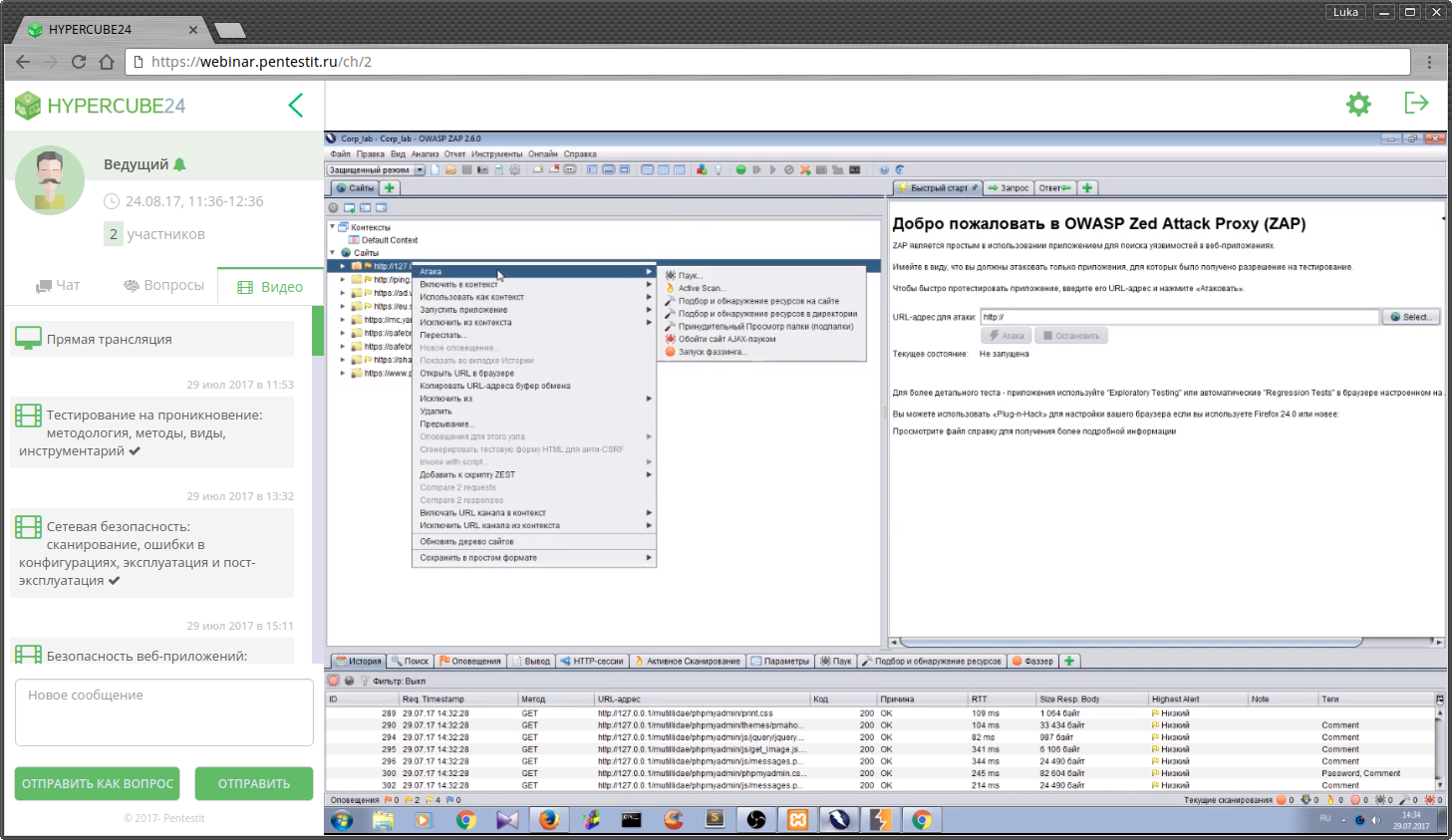Pentestit Corporate Laboratories: Practical Information Security Skills

It is not a secret for anyone that many courses or study materials are of little use in practical life and rather quickly disappear from the heads of those who have learned. Usually this is due to the large amount of theoretical material (often outdated) with weak or absent practical consolidation. It may also be associated with the heterogeneity of the material, the inability to apply the knowledge gained in solving specific problems of information security.
In this article, I will look at examples of skills acquired at Corporate Laboratories for solving problems of ensuring infrastructure security.
Learning process
The learning process is based on the principle: 20% of the theoretical part and 80% of the practice for securing the material. The theoretical parts are given in portions, after which students have access to practical laboratories.
')
One of the distinguishing features of "Corporate laboratories" is the relevance of the material. The absence of a lengthy process of coordinating the training program with different instances allows us to update the course with each set (once every 2 months).
Theory
The course is completely remote. For maximum comfort of students, we have developed a specialized webinar platform, a convenient personal account and a virtual lab environment, which is connected via a VPN connection.
The program "Corporate Laboratories" is developed taking into account the materials and practices used by both hackers and employees of the information security departments of various companies. Listening to the wishes of specialists attending our training, we regularly update the course content so as to ensure comfortable and high-quality training.
To obtain theoretical knowledge, our specialists have developed a specialized webinar site, where theoretical classes are held. Also, at any time of training you can review any of the webinars in the recording. Below is a screenshot of the webinar site:

Information for webinars in the form of teaching aids and practical tasks, class schedules and notifications from the group curator is published in a private office.
Practice
The consolidation of knowledge gained through the unique courses of ethical hacking and penetration testing from Pentestit is performed by completing tasks for hacking and protecting systems of varying complexity in conditions close to real ones. In the process of training, employees study the nature of vulnerabilities, exploitation tools, become familiar with the psychology and tools of the attacker and with the methods of protection.
Practical laboratories contain 26 tasks and become more complicated as the learning process. Tasks in laboratories are interconnected and are imitations of real computer networks and systems. In the course of solving practical tasks, students acquire the following work skills:
- detection of vulnerabilities of network and server devices;
- web application penetration testing - SQL injection, RCE, bruteforce;
- privilege escalation in modern OS;
- Examination of Windows and Linux logs to identify “hacking” systems;
- Examination of Windows and Linux logs for insider detection;
- research of memory dumps and network traffic;
- mobile application reversing;
These skills will allow for testing the penetration of its own infrastructure, using modern methods and tools. Knowledge relating to the investigation of certain incidents will help to quickly deal with the events of the entrusted systems, as well as to promptly and accurately respond to them.
Exam
The final stage is the passage of the examination laboratory.
In modern realities, hacking by corporate intruders begins with the compromising of a company's corporate website or an email account, the authorization form of which is often located within the site or on a subdomain. Getting access to the company's website allows attackers to carry out further attacks inside the organization's network or at this stage to extract financial gain. Examination laboratory is built on the same principle: on the network perimeter there is a site + several services. An example of a “entry point” as a web application with an RCE vulnerability:

By attacking the web applications and services, students get into the internal network and develop attack vectors within the infrastructure. All tasks are interrelated - attacking a service, students receive information to attack other systems: credentials, possible technologies and services, technical information.
These skills will allow you to identify scenarios of penetration into the corporate network and to build effective protective countermeasures. An employee who has gained testing experience from the perspective of an outside intruder can help identify shortcomings in an intrusion detection or monitoring system.
Red Team: teamwork during penetration testing
For those who want to form their team Red Team, having received the best practices in organizing team interaction, our specialists have developed a new training program: Red Team. The course program will help you learn how to effectively use both the toolkit for conducting attacks and the methods and technologies for identifying and analyzing the actions of attackers. The theoretical part will be fixed in a specialized laboratory, which allows in practice to apply all the acquired skills.
The course will effectively apply teamwork skills during penetration testing, gain insight into interaction and data analysis systems, develop Red Team's large-scale operations to detect attack vectors on complex infrastructure, conduct social engineering campaigns and analyze results, detect and counter real-time attacks. , analysis of incidents and affected objects.
Specialists trained in Corporate Laboratories gain invaluable practical experience in working with modern methods and tools to penetrate the system, study the psychology of intruders, investigate cybercrime, and, based on this, learn to develop the most effective defense mechanisms.
Learn more and sign up for the next courses can be on the link .
Source: https://habr.com/ru/post/336164/
All Articles